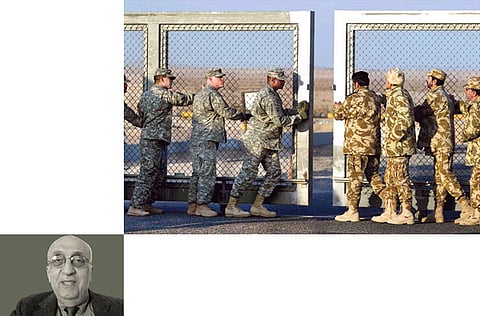Blundering Al Maliki
Iraqi prime minister has fuelled sectarian conflict by targeting his vice-president and deputy on the heels of the US troop withdrawal

Hardly had most American troops withdrawn from Iraq, a step that was marked by a colourless ceremony in Baghdad not attended by a single senior Iraqi official, when the oil-rich Arab state appeared to be on the verge of a dangerous sectarian conflict.
This sordid development seemingly replicates what other Arab states in the region are going through in the wake of the storm swelled by the so-called Arab Spring, which saw several Arab autocrats overthrown, but with hardly any significant change thereafter.
In an ill-advised and worrisome move, Iraqi Prime Minister Nouri Al Maliki, a Shiite, has ordered the arrest of Vice-President Tarek Al Hashemi, a prominent member of the Sunni Iraqiya Party, for allegedly running a death squad which carried out bombings and assassinations. Al Maliki also called on parliament to issue a vote of no-confidence against his own deputy, Saleh Al Mutlaq, who compared him to a dictator.
Al Maliki's surprise actions came shortly after his meeting with US President Barack Obama and only a day after US troops pulled out of Iraq into neighbouring Kuwait. The US military is reported to still have two bases in Iraq and about 5,000 soldiers, including those who attended the low-key ceremony. The US at one time had more than 500 bases and more than 170,000 troops.
Al Maliki's actions have cast a pall of gloom on the American troop withdrawal. There is no doubt that most Americans wanted the war in Iraq to end given that American deaths in the nine-year conflict were much higher than expected at about 4,500. Needless to say, the Iraqi losses were much higher, ranging from 103,775 to 1,446,063, the latter figure provided by the London-based Opinion Research Business.
The cost of the war to the US government is estimated to range between $800 billion to about $1 trillion. Approximately, 1.3 million Iraqis are presently displaced within Iraq and about a million others have taken refuge in neighbouring Syria and Jordan.
Strategic failure
According to Anthony H. Cordesman of the Washington-based Centre for Strategic and International Studies, "the war has been a strategic failure when its costs are compared to its benefits".
He believes that the US "went to war for the wrong reasons: there was no threat from Iraqi missiles and weapons of mass destruction, and Iraq was not linked to Al Qaida or other terrorist attacks on the US or its allies".
Cordesman believes that the US has mistakenly "tied itself to exiles whose claims and ambitions were not in line with the hopes and needs of the Iraqi people, and were often linked to Iran".
He also points out that the Obama administration has not provided "any picture of the strategy it now intends to adopt in the Gulf region as a whole, or how it will deal with any aspect of the threat posed by Iran".
But US Vice-President Joe R. Biden Jr, told Newsweek that the US is not going to "intervene again" even if Iran threatens Iraq. He then spelled out US policy there: "For us to be out of there [Iraq], have Iraq united, secure within its own borders, not a threat to its neighbours and no one able to fundamentally threaten them. That's where they are now. I'm confident by our continued engagement with them we can strengthen that, and that's overwhelmingly in our interest to do that."
This is probably one reason the US embassy in Iraq is the largest in the world, an indication that it is not leaving the country. For one, the embassy houses more than a thousand private contractors, an audacious step unless Iraqi contractors are given priority, considering the losses incurred by the Iraqi people. Iraq is said be one of the poorest countries in the world in spite of its oil wealth — ranking 161st in per capita income.
The test of US intentions remains its handling of the murky political situation in Iraq. The country remains politically unstable now that the members of the Iraqiya party, which won a plurality of votes last year, have walked out of Parliament because of the prime minister's actions. It thus would be an unforgivable mistake if the Obama administration believes it can put all its eggs in one ‘sectarian' basket and remain the source of regional turbulence.
George S. Hishmeh is a Washington-based columnist. He can be contacted at ghishmeh@gulfnews.com


